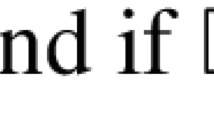Abstract
Up to now theories of semantic information have implicitly relied on logical monism, or the view that there is one true logic. The latter position has been explicitly challenged by logical pluralists. Adopting an unbiased attitude in the philosophy of information, we take a suggestion from Beall and Restall at heart and exploit logical pluralism to recognise another kind of pluralism. The latter is called informational pluralism, a thesis whose implications for a theory of semantic information we explore.
Similar content being viewed by others
References
Adams, F.: 2003, The informational turn in philosophy, Minds & Machines 13, 471–501.
Anderson, A. R. and Belnap, N. D.: 1975, Entailment. The Logic of Relevance and Necessity (Vol I), Princeton University Press, Princeton.
Anderson, A. R., Belnap, N. D., and Dunn, J. M.: 1992, Entailment. The Logic of Relevance and Necessity (Vol II), Princeton University Press, Princeton.
Bar-Hillel, Y. and Carnap, R.: 1952, An outline of a theory of semantic information, MIT, Cambridge, MA, Technical Report 247 (reprinted in: Bar-Hillel, Y., 1964, Language and Information. Selected Essays on Their Theory and Application, Addison-Wesley, London).
Barwise, J.: Constraints, channels, and the flow of information, in P. Aczel, D. Israel, S. Peters, and Y. Katagiri (eds.), Situation Theory and Its Applications Vol. 3, CSLI, Stanford, 1993, pp. 3–27.
Barwise, J.: 1997, Information and impossibilities, Notre Dame Journal of Formal Logic 38, 488–515.
Beall, J. C. and Restall, G.: 2000, Logical pluralism, Australian Journal of Philosophy 78, 475–493.
Beall, J. C. and Restall, G.: 2001, Defending logical pluralism, in B. Brown and J. Woods (eds.), Logical Consequence: Rival Approaches, Hermes, Stanmore, pp. 1–22.
Beall, J. C. and Restall, G.: 2006, Logical Pluralism, Oxford University Press, Oxford.
Devlin, K.: 1991, Logic and Information, Cambridge University Press, Cambridge.
Došen, K.: 1989, Logical constants as punctuation marks, Notre Dame Journal of Formal Logic 30, 362–381.
Dretske, F.: 1999, Knowledge and The Flow of Information. CSLI, Stanford.
Dunn, J. M.: 1976, Intuitive semantics for first-degree entailments and ‘Coupled Trees,’ Philosophical Studies 29, 149–168 (reprinted in: Anderson, Belnap, and Dunn, 1992: Ch. IX §50).
Dunn, J. M.: 1993, Star and perp: two treatments of negation, Philosophical Perspectives 7, 331–357.
Fagin, R., Halpern, J. Y., Moses, Y., and Vardi, M. Y.: 1995, Reasoning About Knowledge, MIT Press, Cambridge.
Fine, K.: 1974, Models for entailment, Journal of Philosophical Logic 3, 347–372.
Floridi, L.: 2004a, Information, in L. Floridi (ed.), The Blackwell Guide to the Philosophy of Computing and Information, Blackwell, Oxford, pp. 40–61.
Floridi, L.: 2004b, Outline of a theory of strongly semantic information, Minds & Machines 14, 197–222.
Floridi, L.: 2005, Is information meaningful data? Philosophy and Phenomenological Research 70, 351–370.
Hanson, W. H.: 1980, First-degree entailments and information, Notre Dame Journal of Formal Logic 21, 659–671.
Hintikka, J.: 1970, On semantic information, in J. Hintikka and P. Suppes (eds.), Information and Inference, Reidel, Dordrecht, pp. 3–27.
Humberstone, I. L.: 2005, Logical discrimination, in J.-Y. Béziau (ed.), Logica Universalis, Birkhäuser Verlag, Basel, pp. 207–228.
Israel, D. and Perry, J.: 1990, What is information, in P. Hanson (ed.), Information, Language and Cognition, University of British Columbia Press, Vancouver, pp. 1–19.
MacKay, D. M.: 1969, Information, Mechanism and Meaning, MIT Press, Cambridge, MA.
Mares, E.: 1997a, Relevant logic and the theory of information, Synthese 109, 345–360.
Mares, E.: 1997b, Paraconsistent probability theory and paraconsistent bayesianism, Logique et Analyse 40, 375–384.
Mares, E.: 2004, Relevant Logic – A Philosophical Interpretation, Cambridge University Press, Cambridge.
Mares, E.: 2006, Relevant logic, probabilistic information, and conditionals, Logique et Analyse 49, 399–411.
Mortensen, C.: 1983, The validity of disjunctive syllogism is not so easily proved, Notre Dame Journal of Formal Logic 24, 35–40.
Mortensen, C.: 1986, Reply to burgess and read, Notre Dame Journal of Formal Logic 27, 195–200.
Paoli, F.: 2002, Substructural Logics a Primer, Kluwer, Dordrecht.
Paoli, F.: 2003, Quine and Slater on paraconsistency and deviance, Journal of Philosophical Logic 32, 531–548.
Popper, K. R.: 1959, Logic of Scientific Discovery, Hutchinson, London.
Priest, G.: 2001a, An Introduction to Non-classical Logic, Cambridge University Press, Cambridge.
Priest, G.: 2001b, Logic: one or many? in J. Woods and B. Brown (eds.), Logical Consequence: Rival Approaches, Hermes, Stanmore, pp. 23–38.
Quine, W. V.: 1986, Philosophy of Logic, Harvard University Press, Cambridge, MA.
Read, S.: 1981, What is wrong with disjunctive syllogism? Analysis 41, 66–70.
Read, S.: 1988, Relevant Logic. A Philosophical Examination of Inference, Basil Blackwell, Oxford.
Read, S.: 2004, In defence of the dog: Response to Restall, in S. Rahman, J. Symons, D. M. Gabbay, and J. P. Van Bendegem (eds.), Logic, Epistemology, and the Unity of Science, Kluwer, Dordrecht, pp. 175–180.
Restall, G.: 1995, Information flow and relevant logic, in J. Seligman and D. Westerståhl, (eds.), Logic, Language and Computation: The 1994 Moraga Proceedings, CSLI Press, pp. 463–477.
Restall, G.: 1999, Negation in relevant logics, in D. M. Gabbay and H. Wansing (eds.), What is Negation? Kluwer, Dordrecht, pp. 53–76.
Restall, G.: 2000, An Introduction to Substructural Logics, Routledge, London.
Restall, G.: 2002, Carnap’s tolerance, meaning and logical pluralism, Journal of Philosophy 99, 426–443.
Restall, G.: 2004, Logical pluralism and the preservation of warrant, in S. Rahman, J. Symons, D. M. Gabbay, and J. P. Van Bendegem (eds.), Logic, Epistemology, and the Unity of Science, Kluwer, Dordrecht, pp. 163–173.
Routley, R. and Routley, V.: 1972, The semantics of first degree entailment, Noûs 6, 335–359.
Sequoiah-Grayson, S.: 2006, Information flow and impossible situations, Logique et Analyse 49, 371–398.
Tanaka, K.: 2003, Three schools of paraconsistency, Australasian Journal of Logic 1, 28–42.
Tennant, N.: 1987, Anti-realism and Logic: Truth as Eternal, Oxford University Press, Oxford.
Troelstra, A. S. and Schwichtenberg, H.: 2000, Basic Proof Theory, Cambridge University Press, Cambridge.
Author information
Authors and Affiliations
Corresponding author
Additional information
Research Assistant of the Fund for Scientific Research – Flanders (Belgium)
Rights and permissions
About this article
Cite this article
Allo, P. LOGICAL PLURALISM AND SEMANTIC INFORMATION. J Philos Logic 36, 659–694 (2007). https://doi.org/10.1007/s10992-007-9054-2
Received:
Revised:
Published:
Issue Date:
DOI: https://doi.org/10.1007/s10992-007-9054-2




